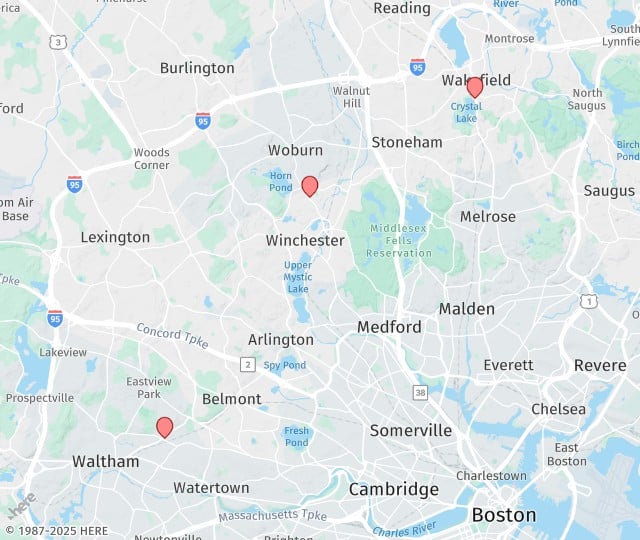Age-related macular degeneration (AMD) is a leading cause of vision loss in adults over 60 and can significantly impact central vision needed for reading, driving, and recognizing faces. At North Suburban Eye, our board-certified ophthalmologists and retina specialists have extensive experience diagnosing and managing all stages of AMD using advanced imaging technology and the latest treatment protocols. Whether you are dealing with early signs of dry AMD or require ongoing care for wet AMD, we deliver expert, personalized treatment to help protect long-term visual function and quality of life.
What Is Macular Degeneration?
Macular degeneration is an age-related condition and is the most common cause of vision loss in people 55 and older. The macula, the center of vision in the retina, is damaged as the disease develops. Decreased function of the central retina occurs with macular degeneration, causing vision to become hazy or blurry. Straight lines may appear wavy; objects may appear as the wrong shape or size, and it may become increasingly difficult to see objects up close.
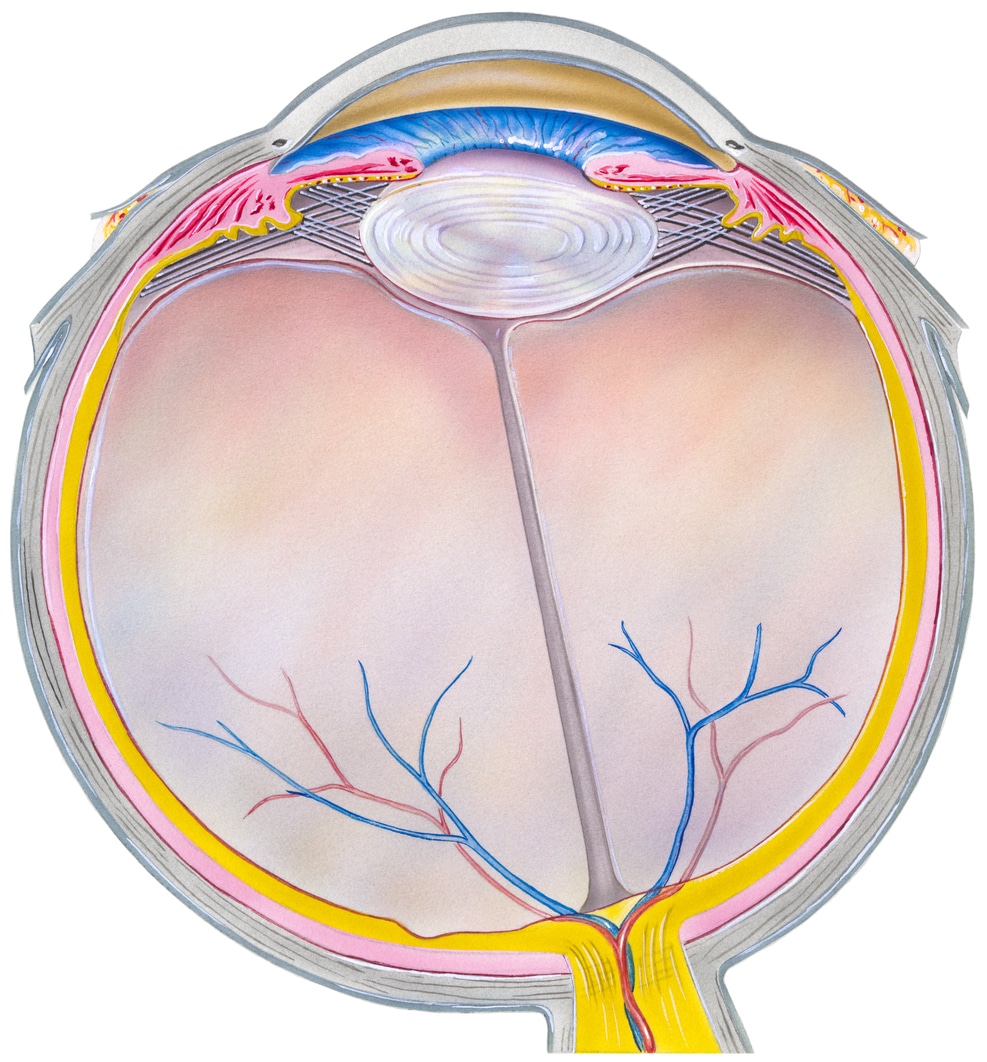
What Are The Symptoms Of Macular Degeneration?
The early symptoms of macular degeneration (dry type) include:
- Slightly blurred central vision at all distances.
- A fuzzy or shadowed spot in central vision.
- Often, there are no symptoms at all with early AMD.
Symptoms of advancing macular degeneration include:
- Difficulty transitioning from high light to low light or vice versa.
- Straight lines appear wavy.
- Difficulty seeing the contrast in textures and color.
- Difficulty with depth perception.
- Loss of the central field of vision.
What Causes Macular Degeneration
Several factors may cause changes in the macula of the eye. Experts believe that oxidative stress and inflammation play a role. Oxidative stress describes disruption in the balance of highly reactive oxygen-containing molecules and the body’s ability to neutralize them. These reactive molecules can interact with other molecules to create inflammation and the groundwork for disease. The oxidative stress within the cells of the eye may be triggered by too much iron in the retina, a deficiency of antioxidants in the body due to poor diet, or by bright light such as unprotected sun exposure. Some people inherit certain genes that increase their susceptibility to inflammation in the retina, thus elevating their risk of macular degeneration.
What Are Potential Risk Factors?
Although macular degeneration is strongly influenced by genetics, research indicates that this eye disease is more often related to factors such as:
- Those over 50 years old.
- Smoking cigarettes.
- AMD in one eye increases the risk in the other eye.
- Sedentary lifestyle limits the oxygenation of all tissues, including the eyes, which can increase the risk of dry macular degeneration.
- People with light-colored eyes are less protected from UV damage and thus more susceptible to macular degeneration.
- UV exposure causes damage to the internal structures of the eye, increasing risks across all eye colors.
- High blood pressure can limit the flow of oxygen-rich blood through the eyes.
- Unstable blood sugar and cholesterol levels increase the risk of eye disease.
Wet Vs. Dry Macular Degeneration
Macular degeneration can occur in two different forms, either “wet” or “dry”.
Dry Macular Degeneration (Non-Neovascular)
Dry macular degeneration is diagnosed in approximately 80 percent of cases. Although dry AMD rarely causes complete blindness, this condition can profoundly affect central vision, having a severe impact on quality of life.
Dry AMD begins with the breakdown of photosensitive cells in the macula. Protein deposits called drusen accumulate under the retina, causing slight blurriness. As more drusen collect in the macula, the photoreceptor cells that provide vision begin to slowly die off due to lack of oxygenation and nutrition.
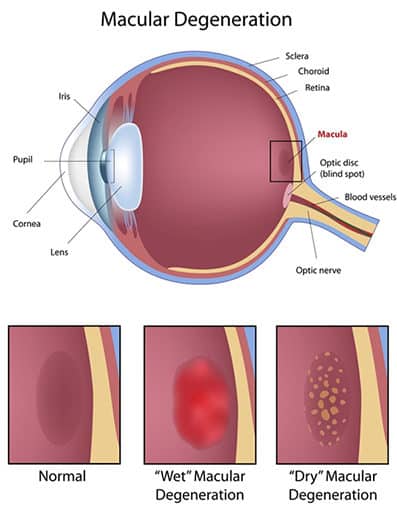
Wet Macular Degeneration (Neovascular)
In a small percentage of cases, dry AMD can progress to wet AMD. Only about 10-20 percent of AMD cases are categorized as wet. However, this type of macular degeneration causes blindness in 90 percent of diagnoses.
Wet AMD involves the growth of new, abnormal blood vessels behind the macula, coinciding with the death of photoreceptor cells and retinal pigment epithelial cells (RPE). The newly formed blood vessels are weak and may leak blood and fluid into the back of the eye. These fluids cause damage to the macula, quickly destroying the visual field.
What Are The Stages Of AMD?
Almost all cases begin as dry macular degeneration. As the disease progresses through stages, the condition may transform to wet macular degeneration. Stages include:
- Early AMD. This stage provides no obvious indication of problems. Vision may be completely normal. However, an eye exam will reveal several small drusen, or granules, on the macula. The doctor will note the number and size of drusen to track the progression of degeneration.
- Intermediate AMD. As drusen grow larger and more numerous, the macula receives fewer nutrients. Retinal cells begin to clump together. Symptoms such as a blurry spot in the central visual field may occur. More light may be needed for tasks such as reading.
- Advanced AMD. It is at this stage when dry AMD may transform to wet AMD. The presence of several large drusen increases the blurry spot in the central vision to a degree that makes tasks like writing and reading difficult.
- End-Stage AMD. In both wet and dry types of AMD, end-stage typically results in irreparable damage to the macula, resulting in vision loss.
How Long Does It Take To Lose Vision With Macular Degeneration?
Studies suggest that vision degrades over about ten years from the time of an AMD diagnosis to vision loss. Research also indicates that certain lifestyle habits can slow this progression.
Boston Macular Degeneration Treatment
Dry AMD Treatment
The earlier that macular degeneration is diagnosed, the earlier we can begin preserving long-term vision. For dry AMD, treatment revolves around slowing the progression of the degenerative process with particular lifestyle habits and supplements.
Wet AMD Treatment
Wet AMD requires prompt treatment to halt the worsening of vision loss. By this stage, some degree of vision may have already been disrupted. Usually, treatment involves injections of angiogenesis inhibitors. These drugs inhibit abnormal blood vessel growth by blocking the activity of vascular endothelial growth factor (VEGF), the protein that supports neovascularization.
Additional Treatment Options
Laser photocoagulation surgery may be considered in a small number of cases. This procedure is performed under local anesthesia that numbs the eye. The laser directs energy to heat, seal, and eliminate leaking blood vessels. The downside of this procedure is that scarring from the treatment may result in a permanent blind spot. However, this procedure can prevent further vision loss caused by fragile blood vessels.
Prevention Of Macular Degeneration
Studies suggest that healthy lifestyle habits and specific supplements may protect vision while also supporting overall health. These strategies may help you if you already have AMD or wish to lower your risk of this condition.
- Maintain an active lifestyle, this may include walking for 30-60 minutes a day.
- Eat fresh, leafy, green vegetables to increase antioxidants in the body.
- Consume orange and yellow fruits, whole grains, and fish.
- Avoid smoking and other types of tobacco use.
- Wear sunglasses and hats when outdoors.
- Stay up to date on health physicals and understand your blood pressure, blood sugar, and cholesterol numbers.
- See your ophthalmologist once a year for a full dilated eye exam.
Risk Factors for Wet and Dry Macular Degeneration
Wet macular degeneration commonly affects individuals over the age of 60, with smoking and hypertension also increasing the risk. These conditions exacerbate the leakage of fluids and blood from newly formed blood vessels under the macula.
Conversely, genetic predisposition often influences dry macular degeneration and can be aggravated by cumulative UV exposure and dietary deficiencies. A lack of antioxidants and essential nutrients can accelerate the deterioration of the retina.
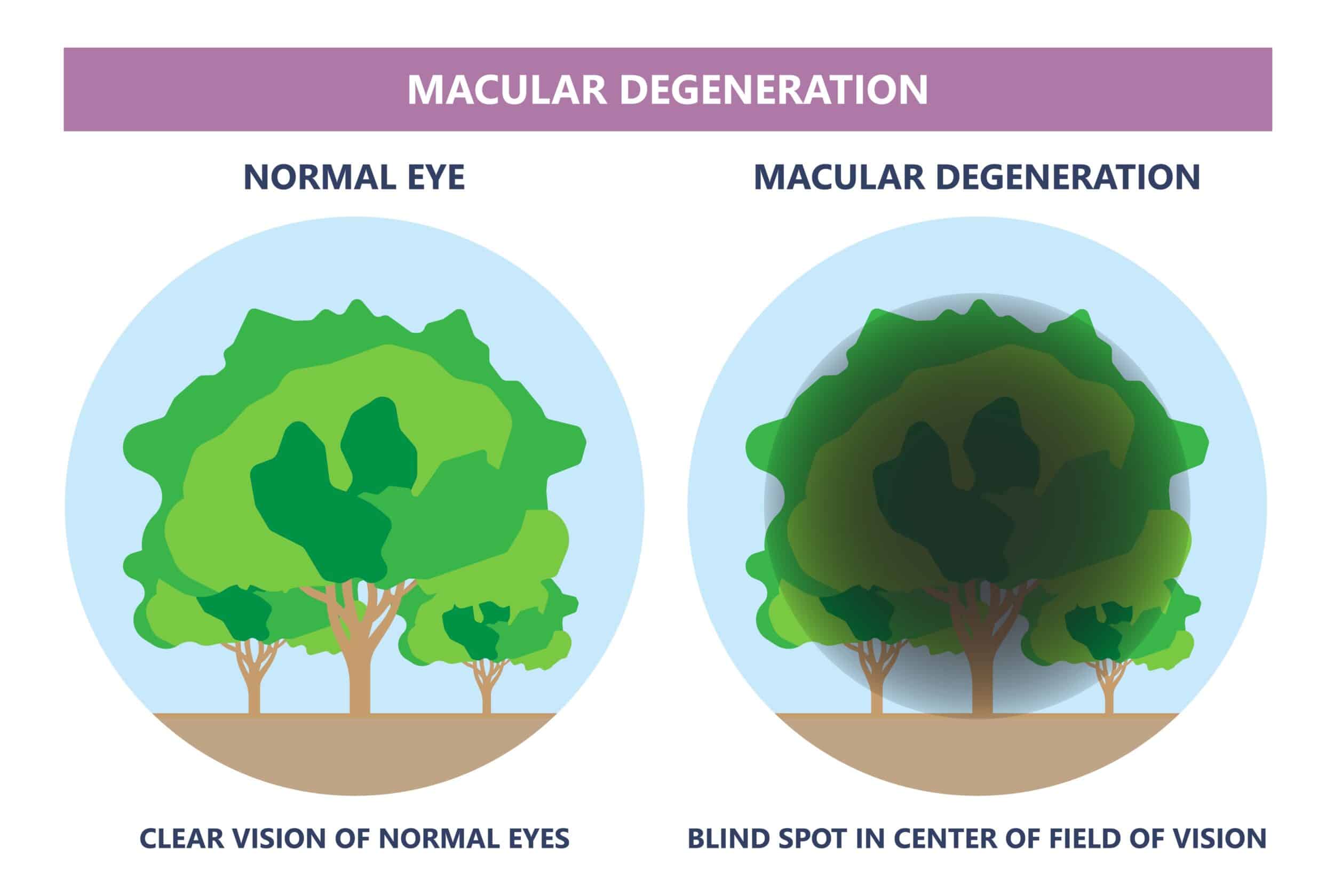
Diagnostic Tests and Procedures
Early detection of macular degeneration is crucial for effective management. Common diagnostic tools include the Amsler Grid, which individuals can use at home to monitor changes in central vision. Optical Coherence Tomography (OCT) provides high-resolution images of the retina, identifying fluid or blood beneath the macula. Fluorescein Angiography involves injecting a dye to highlight blood flow in the retina, revealing new vessels or leakage.
Lifestyle Modifications and Dietary Changes
Managing macular degeneration involves lifestyle adjustments that can slow the progression and mitigate symptoms. It is crucial to quit smoking and make dietary adjustments that emphasize foods rich in lutein, zeaxanthin, and omega-3 fatty acids, such as leafy greens, fish, and nuts. Regular exercise also helps maintain blood pressure and weight, reducing eye strain.
Macular Degeneration FAQs
What are the early signs and symptoms of macular degeneration?
Early symptoms may include blurriness in central vision, difficulty adapting to low light levels, and seeing straight lines as wavy or broken.
What is the role of genetics in macular degeneration?
Genetics play a significant role in macular degeneration, with several genes linked to an increased risk. Genetic testing can provide insights into an individual’s risk and guide preventative strategies.
If you have a family history, getting regular eye exams, maintaining a healthy lifestyle, and discussing preventative measures with your eye care professional is important.
Are there any specific dietary recommendations or supplements that can help slow the progression of macular degeneration?
Yes, diets high in antioxidants and zinc can be beneficial. Supplements specifically formulated for eye health, such as those containing lutein and zeaxanthin, may also help slow the progression.
How often should someone at risk of macular degeneration visit an eye doctor?
Individuals at risk for macular degeneration should schedule eye exams at least once a year. Those with a family history or other significant risk factors might benefit from more frequent check-ups. Regular monitoring helps in early detection and effective management of the condition.
Does macular degeneration treatment hurt?
Treatments like injections may cause brief discomfort but are generally well-tolerated. Most patients report little to no pain, as topical anesthetics are used to minimize discomfort during procedures.
What are the costs of treating macular degeneration?
The costs can widely vary depending on the type of treatment. Medications, especially newer injectables, can be expensive, but many are covered by medical insurance.
Why should I choose North Suburban Eye Associates for macular degeneration treatment?
North Suburban Eye Associates offers expert care with state-of-the-art diagnostic and treatment options. Our team of doctors specializes in the latest therapies for macular degeneration, providing personalized treatment plans and supportive care to manage this condition effectively.
What Can I Expect During an AMD Diagnostic Eye Exam?
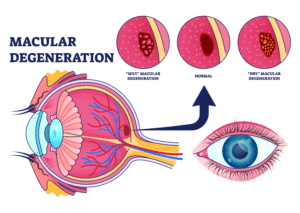
- Visual acuity test to check for blurriness or distortion
- Amsler grid test to detect central vision abnormalities
- Dilated eye exam for a detailed view of the retina and macula
- Optical coherence tomography (OCT) to capture high-resolution cross-sectional images of the retina
- Fluorescein angiography (when needed) to assess blood vessel leakage in wet AMD
These tests help our specialists determine the stage and type of AMD, guiding appropriate treatment recommendations.
What Are Some Common Myths About AMD Progression?
There’s a lot of confusion about how AMD progresses. Here are a few misconceptions:
- Myth: All AMD leads to blindness.
Fact: Many patients retain peripheral vision and adapt well with support. - Myth: Vision loss happens suddenly.
Fact: In most cases, AMD worsens gradually, allowing time for monitoring and treatment. - Myth: There’s nothing that can be done.
Fact: Treatments like anti-VEGF therapy and lifestyle changes can slow or halt progression.
Our team helps patients understand their diagnosis and create a personalized management plan.
How Do I Cope with Central Vision Loss?
If you have advanced AMD, you can benefit from tools designed to improve function and independence, such as:
- High-contrast and large-print reading materials
- Magnifying glasses and video magnifiers
- Audio book and voice assistant technology
- Special lighting for reading or hobbies
- Electronic devices with screen readers and text resizing features
Occupational therapy can help identify the most effective tools for your needs.
How Does Vision Rehabilitation Supports AMD Patients?
Vision rehabilitation helps patients adapt to central vision loss through:
- Training in the use of remaining peripheral vision
- Strategies for navigating the home and public spaces
- Counseling and support for coping with vision changes
- Instruction in using low-vision devices effectively
These services can significantly improve quality of life and confidence for patients living with AMD.
How Does Anti-VEGF Therapy for Wet AMD Work?
Anti-VEGF medications are the gold standard for treating wet AMD. These medications block vascular endothelial growth factor (VEGF), which causes abnormal blood vessel growth in the retina.
- Treatment is administered through a small, quick injection into the eye
- Injections are usually done monthly at first, with the frequency adjusted over time
- Patients often experience stabilized or improved vision with ongoing care
The eye doctors at North Suburban Eye have extensive experience with anti-VEGF injections and monitor patient progress closely.
Schedule a Consultation
Early evaluation is critical if you’ve noticed changes in your central vision or have a family history of macular degeneration. The retina specialists at North Suburban Eye in Wakefield, Winchester, and Waltham, MA offer expert diagnosis, advanced treatment options, and comprehensive support for patients at every stage of AMD. Schedule an eye exam today by calling 781-245-5200 to take the next step toward preserving your vision.

